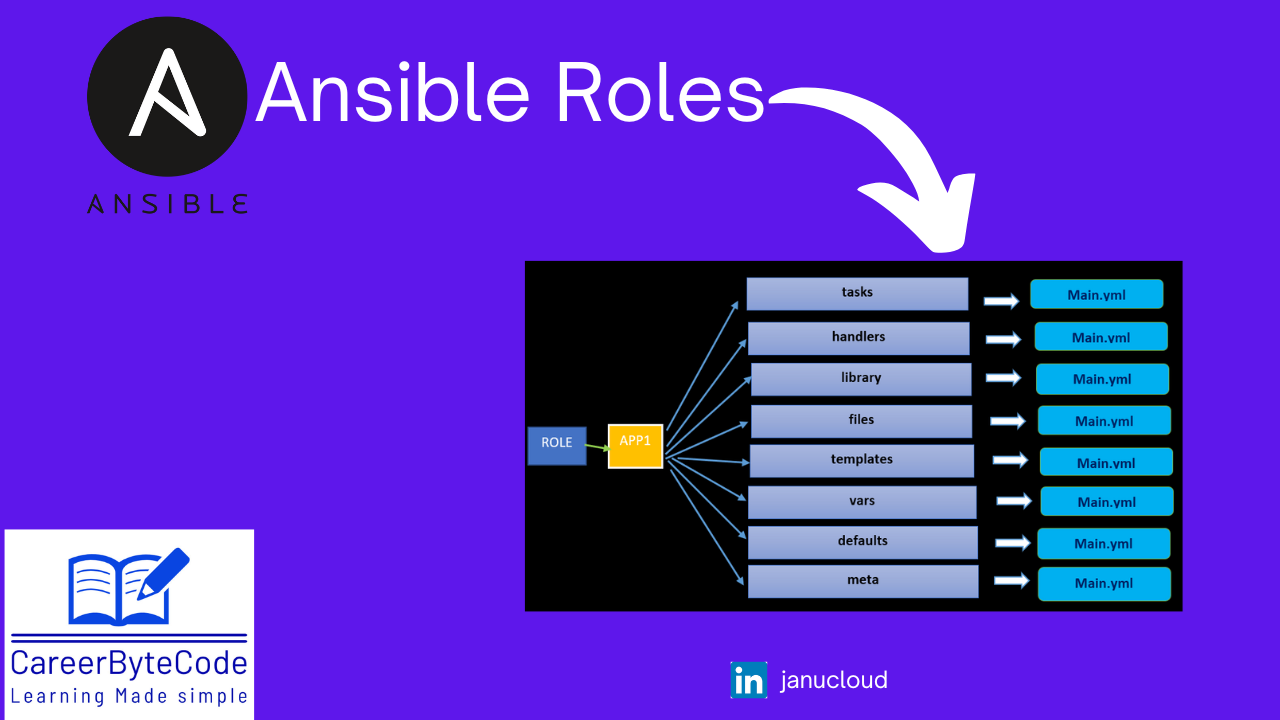
Understanding Roles in Ansible: A Key to Efficient Automation
Akurati Jahnavi
?? Cloud & DevOps Engineer | ?? AWS | ?? Azure | ?? Docker & Kubernetes | ?? IaC with Terraform & Ansible | ?? Problem-Solver | ?? Lifelong Learner
Ansible is a powerful tool for automating IT tasks, but as automation grows in complexity, managing playbooks can become cumbersome. This is where Ansible roles come into play. Roles help streamline automation by promoting modularity, reusability, and better organization of code.
What Are Ansible Roles?
Ansible roles are self-contained units of reusable code that include variables, tasks, handlers, templates, and other components organized in a predefined directory structure. By breaking down playbooks into roles, you can:
For example, instead of writing a single large playbook to configure multiple services or environments, you can create separate roles for each service (e.g., Apache setup, database configuration) and call them as needed.
How Do Roles Help?
Roles provide several advantages:
Real-World Example: Checking Multiple URLs with Ansible Roles
Let’s consider a practical example from daily operations. Imagine you need to check the availability of 1,000 URLs. Writing individual playbooks for each URL would be inefficient and error-prone. Instead, you can use roles to simplify this process:
Here’s how it might look:
Step 1: Creating the singleurl Role
The singleurl role is responsible for checking if a given URL is reachable.
tasks/main.yml in singleurl
---
- name: check if URL is reachable
uri:
url: "{{ url }}"
- name: Print URL status
debug:
msg: "{{ url }} is working and reachable"
Playbook to use singleurl
---
- name: Test URL reachability
hosts: all
roles:
- singleurl
Running the Playbook
ansible-playbook urlcheckviarole.yml
Sample Output:
领英推荐
TASK [singleurl : check URL is reachable] ********************************
OK: [client1]
TASK [singleurl : Print URL status] ************************************
msg: "https://www.google.com is working and reachable"
Step 2: Extending to Multiple URLs with multiurl
Instead of calling the singleurl role for each URL manually, we create a multiurl role that depends on singleurl and provides multiple URLs.
meta/main.yml in multiurl
dependencies:
- { role: singleurl, url: "https://cloudnloud.com/" }
- { role: singleurl, url: "https://youtube.com/" }
- { role: singleurl, url: "https://www.tcs.com/" }
- { role: singleurl, url: "https://www.infosys.com/" }
- { role: singleurl, url: "https://www.redhat.com/" }
tasks/main.yml in multiurl
- name: Print all URL monitoring tasks completed
debug:
msg: "We now have good confidence in what roles and dependencies are."
Step 3: Running the Multi-URL Playbook
ansible-playbook multiurlcheck.yml
By using this approach, you avoid repetitive code and ensure consistency across all URL checks.
Getting Started with Roles
To create your first role, use the ansible-galaxy init <role_name> command. This generates the standard directory structure for your role. From there, define tasks, variables, and handlers specific to your automation needs.
Benefits of This Approach
? Efficiency: Instead of writing repetitive tasks for each URL, we define the logic once and reuse it.
? Scalability: Easily extend the solution to check thousands of URLs by just adding them to the meta/main.yml file.
? Maintainability: If we need to modify the check logic, we only update the singleurl role, not multiple playbooks.
Conclusion
Ansible roles are essential for anyone looking to scale their automation efforts efficiently. By breaking down tasks into reusable components, roles not only simplify complex workflows but also foster collaboration and scalability.
Have you used Ansible roles in your projects? Share your experiences or challenges in the comments—I’d love to hear how others are leveraging this powerful feature!
Feel free to modify this draft based on your style preferences or add more technical details as needed!
??Follow Akurati Jahnavi for more on Cloud, DevOps & IT Career Related.
?? Repost & help someone find this valuable.
#ansible #automation #devOps #configurationManagement CareerByteCode #janucloud
?? Cloud & DevOps Engineer | ?? AWS | ?? Azure | ?? Docker & Kubernetes | ?? IaC with Terraform & Ansible | ?? Problem-Solver | ?? Lifelong Learner
3 周#connections
?? DevOps Engineer | ?? Empowering Growth & Mentoring | ??? Azure, AWS, Kubernetes | ?? Automation | ?? CI/CD | ??? Terraform | ?? Passionate About Cloud-Native Solutions & Continuous Learning
3 周Akurati Jahnavi, it's very informative with a simple example that makes the concept easy to understand. Ansible roles help avoid confusion, enhance reusability, improve scalability, and facilitate collaboration within teams.
?? DevOps Engineer | ?? AWS Cloud & GCP | ?? Docker Containers | ??Linux | ??? Technical Writer | ??? Terraform, Kubernetes, CI/CD | ?? Monitoring with Prometheus & Grafana | ?? Automating Scalable Systems
3 周Very informative
MLOps enthusiast | DevOps Engineer | AWS CCP | Terraform & Vault Associate | Exploring Monitoring & Security (Prometheus, Grafana, OpenTelemetry, Tfscan, Trivy, SonarQube, Snyk)
3 周Akurati Jahnavi Absolutely, Ansible plays a major role in automation by streamlining configuration management and deployment processes. ?? Ansible Roles help in structuring playbooks efficiently, making them reusable, modular, and scalable. They allow teams to organize automation tasks in a structured way, improving maintainability and collaboration. Looking forward to sharing more insights on Ansible. #Ansible #Automation #DevOps #InfrastructureAsCode #CI/CD
?? Cloud DevOps | ?? Azure | ??? Terraform | ?? Docker | ?? Kubernetes | ?? Infrastructure Automation Enthusiast | ?? Driving Scalability & Innovation
3 周Very informative